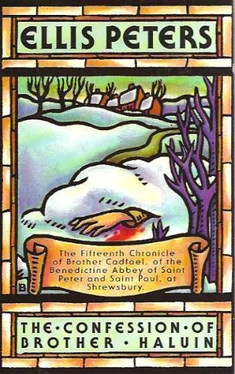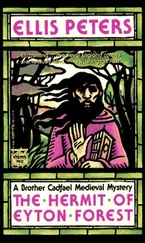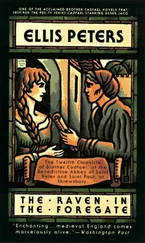Ellis Peters - The Confession of Brother Haluin
Здесь есть возможность читать онлайн «Ellis Peters - The Confession of Brother Haluin» весь текст электронной книги совершенно бесплатно (целиком полную версию без сокращений). В некоторых случаях можно слушать аудио, скачать через торрент в формате fb2 и присутствует краткое содержание. Жанр: Исторический детектив, на английском языке. Описание произведения, (предисловие) а так же отзывы посетителей доступны на портале библиотеки ЛибКат.
- Название:The Confession of Brother Haluin
- Автор:
- Жанр:
- Год:неизвестен
- ISBN:нет данных
- Рейтинг книги:4.5 / 5. Голосов: 2
-
Избранное:Добавить в избранное
- Отзывы:
-
Ваша оценка:
- 100
- 1
- 2
- 3
- 4
- 5
The Confession of Brother Haluin: краткое содержание, описание и аннотация
Предлагаем к чтению аннотацию, описание, краткое содержание или предисловие (зависит от того, что написал сам автор книги «The Confession of Brother Haluin»). Если вы не нашли необходимую информацию о книге — напишите в комментариях, мы постараемся отыскать её.
The Confession of Brother Haluin — читать онлайн бесплатно полную книгу (весь текст) целиком
Ниже представлен текст книги, разбитый по страницам. Система сохранения места последней прочитанной страницы, позволяет с удобством читать онлайн бесплатно книгу «The Confession of Brother Haluin», без необходимости каждый раз заново искать на чём Вы остановились. Поставьте закладку, и сможете в любой момент перейти на страницу, на которой закончили чтение.
Интервал:
Закладка:
Ellis Peters
The Confession of Brother Haluin
Chapter One
The worst of the winter came early, that year of 1142. After the prolonged autumn of mild, moist, elegiac days, December came in with heavy skies and dark, brief days that sagged upon the rooftrees and lay like oppressive hands upon the heart. In the scriptorium there was barely light enough at noon to form the letters, and the colors could not be used with any certainty, since the unrelenting and untimely dusk sapped all their brightness. The weather-wise had predicted heavy snows, and in midmonth they came, not with blizzard winds, but in a blinding, silent fall that continued for several days and nights, smoothing out every undulation, blanching all color out of the world, burying the sheep in the hills and the hovels in the valleys, smothering all sound, climbing every wall, turning roofs into ranges of white, impassable mountains, and the very air between earth and sky into an opaque, drifting whirlpool of flakes large as lilies. When the fall finally ceased, and the heavy swags of cloud lifted, the Foregate lay half buried, so nearly smoothed out into one white level that there were scarcely any shadows except where the tall buildings of the abbey soared out of the pure pallor, and the eerie, reflected light made day even of night, where only a week before the ominous gloom had made night of day.
These December snows, which covered most of the west, did more than disrupt the lives of country people, starve some isolated hamlets, bury not a few hill shepherds with their flocks, and freeze all travel into enforced stillness; they overturned the fortunes of war, made sport of the preoccupations of princes, and sent history spinning off-course into the new year of 1143.
They also brought about a strange cycle of events in the abbey of Saint Peter and Saint Paul, at Shrewsbury.
In the five years that King Stephen and his cousin, the Empress Maud, had fought for the throne of England, fortune had swung between them like a pendulum many times, presenting the cup of victory to each in erratic turn, only to snatch it away again untasted, and offer it tantalizingly to the other contender. Now, in the white disguise of winter, it chose to turn probability topsy-turvy once again, and deliver the empress out of the king’s mailed hands as by a miracle, just as his fist seemed closing securely on his prisoner, and his warfare triumphantly ending. Back to the beginning of the five-year struggle, and all to do again. But that was in Oxford, far away beyond the impassable snows, and some time would elapse before the news reached Shrewsbury.
What was happening in the abbey of Saint Peter and Saint Paul was no more than a small annoyance by comparison, or seemed so at first. An envoy from the bishop, lodged in one of the upper chambers of the guest hall, and already irritated and displeased at being halted here perforce until the roads were passable again, was unpleasantly awakened in the night by the sudden descent of a stream of icy water onto his head, and made very sure that everyone within range of his powerful voice should hear of it without delay. Brother Denis the hospitaler made haste to placate him, and move him to a dry bed elsewhere, but within the hour it became clear that while the first drenching soon slackened, a steady drip continued, and was soon joined by half a dozen more, spanning a circle some yards across. The great weight of snow on the southern roof of the guest hall had somehow worked a passage through the lead and filtered in between the slates, perhaps even caved in a number of them. Pockets of the driven snow had felt the comparative warmth within, and with the mute malice of inanimate things had chosen to baptize the bishop’s emissary. And the leak was rapidly getting worse.
There was urgent conference at chapter that morning over what should and could be done. Perilous and unpleasant work on roofs was certainly to be avoided if possible during such weather, but on the other hand, if repairs were delayed until the thaw came, they were in for a flood, and the damage, limited at this point, might be greatly aggravated.
There were several among the brothers who had worked on the building of additions to the enclave, barns and stabling and storehouses, and Brother Conradin, who was still in his fifties and robust as a bull, had been one of the first child oblates, and worked as a boy under the monks of Seez, brought over by the founding earl to supervise the building of his abbey. Where the fabric was concerned, Brother Conradin’s advice carried the greatest weight, and having viewed the extent of the leak in the guest hall, he stated firmly that they could not afford to wait, or they might have to replace half the southern slope of the roof. They had timber, they had slates, they had lead. That southern slope overhung the drainage channel drawn off from the mill leat, frozen hard at present, but there would be no great difficulty in raising a scaffolding. True, it would be bitterly cold work up there, shifting the mountain of snow first, to ease away the deforming weight, and then replacing broken or displaced slates and repairing the lead flashings. But if they worked in short spells, and were allowed a fire in the warming room all day as long as the work lasted, the job could be done.
Abbot Radulfus listened, nodded his formidable head with his usual prompt comprehension and decision, and said, “Very well, do it!”
As soon as the long snowfall ceased, and the skies lifted, the tough inhabitants of the Foregate sallied forth from their houses, well muffled and armed with shovels and brooms and long-handled rakes, and began to clear their way out to the highroad, and between them dig out a passage to the bridge and the town, where no doubt the stout burgesses within the walls were tackling the same seasonal enemy. The frost still held, and day by day fretted away mysteriously into the air the surface fringes of every drift, by infinitely slow degrees lessening the load. By the time a few of the main highways were again passable, and a few travelers, either foolhardy or having no choice, were laboriously riding them, Brother Conradin had his scaffolding up, his ladders securely braced up the slope of the roof, and all hands taking their turn aloft in the withering cold, cautiously shifting the great burden of snow, to get at the fractured lead and broken slates. A moraine of crumpled, untidy snow hills formed along the frozen drainage channel, and one unwary brother, who had failed to hear or heed the warning shout from above, was briefly buried by a minor avalanche, and had to be dug out hurriedly and dispatched to the warming room to thaw out.
By then the way was open between town and Foregate, and news, however hampered and slow its passage, could be carried from Winchester even to Shrewsbury in time to reach the castle garrison and the sheriff of the shire some days before Christmas.
Hugh Beringar came down from the town hotfoot to share it with Abbot Radulfus. In a country debilitated by five years of desultory civil war it behooved state and church to work closely together, and where sheriff and abbot were of like mind they could secure for their people a comparatively calm and orderly existence, and fend off the worst excesses of the times. Hugh was King Stephen’s man, and held the shire for him loyally enough, but with even greater goodwill he held it for the folk who lived in it. He would welcome, and this autumn and winter had certainly been expecting, the king’s triumph at last, but his chief preoccupation was to hand over to his lord a county relatively prosperous, contented, and intact when the last battle was over.
He came looking for Brother Cadfael as soon as he had left the abbot’s lodging, and found his friend busy stirring a bubbling pot over his brazier, in his workshop in the herb garden. The inevitable coughs and colds of winter, the chilblained hands and heels, kept him busy replenishing the medicine cupboard in the infirmary, and thanks to the necessary brazier his timber workshop was somewhat warmer to work in than the carrels of the scriptorium.
Читать дальшеИнтервал:
Закладка:
Похожие книги на «The Confession of Brother Haluin»
Представляем Вашему вниманию похожие книги на «The Confession of Brother Haluin» списком для выбора. Мы отобрали схожую по названию и смыслу литературу в надежде предоставить читателям больше вариантов отыскать новые, интересные, ещё непрочитанные произведения.
Обсуждение, отзывы о книге «The Confession of Brother Haluin» и просто собственные мнения читателей. Оставьте ваши комментарии, напишите, что Вы думаете о произведении, его смысле или главных героях. Укажите что конкретно понравилось, а что нет, и почему Вы так считаете.












